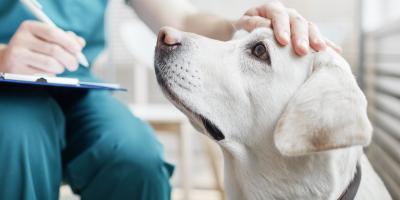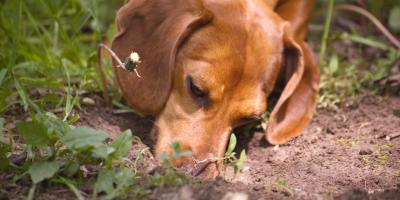Dog Diarrhea: Causes, Symptoms & Treatment


Dog diarrhea is a fairly common condition among our canine companions. While cleaning up your pet’s loose stools probably isn’t your favorite pastime, understanding what causes their digestive upset is important.
There isn’t a single type of diarrhea in dogs. It’s characterized by a variety of factors including frequency, volume and color. Your pet’s health and emotional state may also play a role.
How do you know if your dog’s unformed poop is temporary or a sign of something more serious? Read on to learn about the causes and symptoms of this condition, as well as tips on how to stop diarrhea in dogs.
Symptoms of Dog Diarrhea
Dog diarrhea symptoms usually aren’t hard to identify. They range from stools that are soggy but still formed to flat, shapeless puddles.
These bowel movements may be larger than usual, although smaller stools are also possible and might be accompanied by straining. It’s not unusual for diarrhea to occur a few times in a 24-hour period.
By contrast, healthy dog poop is mostly solid, medium-brown and log-shaped, but there can be a range of variations depending on your pet’s diet.
If your dog’s watery stool contains colors or is accompanied by other symptoms such as vomiting and/or listlessness, contact your veterinarian as soon as possible.
Causes of Diarrhea in Dogs
If you’re wondering, Why does my dog have diarrhea?, it might be caused by one of the following reasons:
Dietary Indiscretion
Dogs may consume a variety of foods without discrimination. Whether it’s a plant or a scrap of human food, their eating habits can occasionally be harmful to them.
Food Intolerance
Some canines simply can’t tolerate certain ingredients, even if they’re deemed safe for dogs. (Note an intolerance is different from a food allergy, which can also lead to gastrointestinal signs and/or may include skin issues too.)
Parasitic Infection
Parasites such as roundworms, hookworms and giardia can all cause serious digestive upset in dogs.
Abrupt Change in Diet
If you change dog food too quickly, your pet’s digestive system may struggle to keep up. It’s recommended that you switch food slowly over the course of 7 to 10 days.
Stress
Common stressful situations that can trigger GI upset in a dog include adoption, boarding, separation anxiety, changes in the household or environment, and introduction of a new pet or family member.
Side Effects to Medication
Many medications, including antibiotics, may lead to the unfortunate side-effect of dog diarrhea.
Inflammatory Bowel Disease
In dogs, IBD stands for Inflammatory Bowel Disease, which is a chronic gastrointestinal disorder characterized by inflammation in the digestive tract. IBD in dogs is an umbrella term for a group of diseases such as Colitis that occur in the small and large intestines.
Infections
Diarrhea can also be a sign of an underlying infection such as parvovirus or salmonella.
Diagnosing Dog Diarrhea
Acute diarrhea may resolve itself in a relatively short period of time. Usually, no action is required by you other than caring for your dog at home.
If the condition persists or reoccurs frequently, contact your veterinarian. They may try to localize the issue to the large or small bowel and can prescribe the best treatment for resolution.
Paying attention to symptoms can help narrow down the possible causes. The color and consistency of the poop are often clues.
Your veterinarian might also take a stool sample or, if necessary, recommend a colonoscopy if they suspect the diarrhea originates from the large bowel.
Dog Diarrhea Treatment
If you’re wondering how to stop diarrhea in dogs, there are some treatment options you can try at home if your pet seems healthy otherwise.
First, withhold food only for 24 hours. This will give their distressed GI tract a chance to rest and recover. (Never restrict water. Your dog will need water since they are losing fluids through diarrhea.)
With persistent diarrhea, you should take your dog to see the veterinarian.
Your veterinarian will treat your dog’s diarrhea based on its cause, which may involve antibiotics for bacterial infections, anthelmintics for intestinal parasites, or a special diet for other gastrointestinal issues.
What Can I Give My Dog for Diarrhea?
Always consult with your veterinarian before giving anything to your dog for diarrhea. Note there are many over-the-counter products for humans that might not be suitable for dogs.
Certain probiotics may also be a good idea as they promote healthy bacteria in your pet’s gut. These can be offered as supplements or through dog food with probiotics. It is important to use a brand you trust that has research to support its claims. Not all probiotics are created equal.
While some probiotics may be used to treat diarrhea, they can also be a preventative measure. Anxious dogs who experience stress diarrhea may also benefit from them as they can maintain microbial balance in the intestines.
What to Feed a Dog With Diarrhea
Again, if your dog has diarrhea, try not to feed them for a period of 24 hours. If their symptoms are improving, then you can offer them a highly digestible diet such as boiled skinless chicken and cooked white rice.
If they don’t have a negative reaction, restart their normal diet after a day or so.
If your pet has a sensitive stomach or reoccurring diarrhea, dog food for digestive health may help by promoting a healthy gut.
When to See a Veterinarian
Not sure if you should contact your veterinarian about your dog’s diarrhea? Here are some warning signs:
- The stool is red, black or tarry
- There are other symptoms such as vomiting, dehydration or lethargy
- Your pet is a young puppy or senior dog
- The diarrhea lasts for more than a day or reoccurs
While it can be unpleasant, dog diarrhea is a condition that affects many canines. Fortunately, it often passes on its own and can be treated by you at home. If it persists, though, contact your veterinarian for guidance.
For more care tips, check out our dog health articles for insight from our experts.
Related articles

Reward Yourself with myPurina
Earn and redeem rewards for Purina products with the myPurina app.



